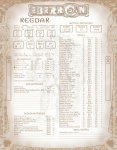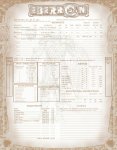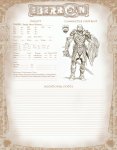I enjoy GURPS, but I found that the additional burden in preparation time wasn't really worth it. But I'd still play. The system has alot of merit.
If you consider yourself a simulationist, check out GULLIVER. It fixes alot of the holes in GURPS.
I agree with the general gist of your complaint. It reminds me of the sort of feelings that drove me from 1st edition AD&D to GURPS. However, your specific example leaves alot to be desired. If you can't drop a character in one shot, it's not a mook. If the gaurd was supposed to be a mook, then it was really poor mook design at fault and not the system. The inability to drop equivalent level characters in a single hit is a feature - not a bug. It helps avoid, 'Whoops, there goes the villain. Well, wasn't that anticlimatic.' If anything, D&D tends to allow characters to be dropped too easily. (GURPS actually makes it harder, but then you start to realize that you might as well flip a coin to determine the outcome as go through all the motions.) What you learn by playing multiple systems is that there is no perfect system.
But assuming you want as a goal 'dropping non-mook characters in a single blow'
a) Allow power attack with a light weapon.
b) The assassin class has a 'death attack' design to provide for exactly this sort of thing. Under the default rules, simply level in assassin if you want to play 'a silent blade in the night, killing his foes swiftly and silently if he could get the drop on them'.
c) However, probably an even better choice if you want to feature this sort of game play is to make 'death attack' (with some changes to accomodate being removed from the PrC framework) available as a feat with prerequisites similar to those you need to take the PrC (something like, Disguise 4 ranks, Hide 8 ranks, Move Silently 8 ranks, sneak attack +2d6).
d) If the intention of the character is to be a mook, then he should have stats commiserate with being a mook. He should be something like a 2nd level warrior with 11 hit points - dispatchable by even a 3rd level rogue in a pinch. If the guy is a 4th level fighter with 26 hit points, then he's not a mook. He's a highly competent hero in his own right who normally kicks ass and the fact that all he can do against you is with every ounce of his reserves manage to ring the bell before dying then that makes you ungodly deadly and quick.
And don't complain about how the rules as written in any system constrain your game from being the one you want to play. GURPS acquires at least as many house rules as any edition of D&D I've ever played. See the above GULLIVER for a somewhat (not that atypically) extreme example. GURPS acquires bloat as well as any game system out there once you start adding source books. If you've played GURPS for any length of time you know that it also has clunky bits, is prone to power gaming, and doesn't create versimilitude nearly as well as one would like on occassion.
PS: I just really caught the implications of 'I dropped my campaign a year ago'. Nevermind. You are still on your honeymoon with the system. Every decent system seems really great in the first year or so. At least for me, it takes at least a year before the nagging flaws really start to bother you so much that it detracts from the joy of gaming and you start trying to remodel the house.



